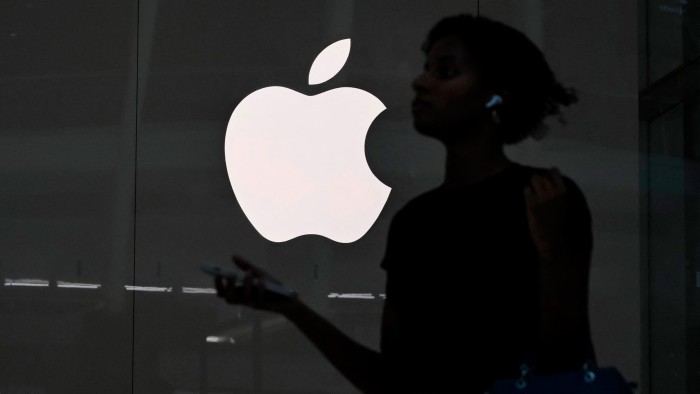Share this @internewscast.com
Unlock the Editor’s Digest for free
Apple reported impressive quarterly earnings on Thursday, yet concerns persisted among investors about the impact of President Donald Trump’s trade policies on the iPhone giant and its progress in the artificial intelligence arena.
While Apple shares gained a modest 2 percent in after-hours trading, they remained under this week’s peaks. This is despite the company reporting an impressive 10 percent revenue growth for the quarter ending in June and offering an optimistic outlook.
“Investors are overlooking the positive outcomes, which underscores the significant uncertainties facing Apple today,” commented Gene Munster, managing partner at Deepwater Asset Management. “It has essentially become a situation where Apple needs to prove itself continually.”
Trump’s trade and tariff strategies have significantly affected Apple, particularly since his “liberation day” announcements in April, which shaved approximately $700 billion off its market value.
In recent months, concerns have also arisen about Apple’s position relative to competitors in artificial intelligence, alongside potential legal and regulatory challenges that could threaten its services sector in the long run.
Prior to the earnings announcement, Apple’s shares had dropped 17 percent since the beginning of the year, diverging from industry peers like Nvidia, Microsoft, and Meta, who have posted significant gains.
The company expects about $1.1bn in tariff-related costs in the quarter to September, assuming the current tariff rates do not change, chief executive Tim Cook said.
Just hours after Apple released its earnings on Thursday, Trump reimposed tariffs on imports from critical partners, including India. Cook earlier confirmed the “majority” of iPhones sold in the US now originated from India.
While the $1.1bn tariff impact is “chump change” for the $3tn tech giant, Munster said the extra cost “psychologically . . . just needles the investors with their greatest fears: that it’s going to slow growth”.
Cook faced a barrage of questions on Thursday’s earnings call with analysts, focused on its delayed AI efforts and how tariffs would impact its sprawling global supply chain and crucial device sales.
Global iPhone sales were up 13.5 per cent year on year in the quarter to June at $44.6bn.
Chief financial officer Kevan Parekh said there had been “some evidence” that sales were boosted by customers placing orders to get ahead of US tariffs early in the quarter.
He estimated the tariff-related boost from early shopping was worth “about a point of the 10 points of year-on-year growth”.
Munster said the revenue boost for the quarter could also be partly attributed to a growing pool of customers due for an upgrade to their ageing devices.
Apple said its gross margin, which is being closely watched for signs of tariff costs weighing on profitability, was 46.5 per cent in the quarter — better than estimates of 46 per cent.
It expects “mid to high single-digit growth” for the current quarter, with gross margin remaining stable at between 46 per cent and 47 per cent.
In China, Apple’s sales have suffered from competition from local handset makers such as Huawei and Xiaomi. However, revenue from China increased 4 per cent in the quarter from a year ago, hitting $15.4bn and bucking a trend of quarterly declines.
Cook told analyst the growth in China had been driven by the iPhone, with some of Apple’s products benefiting from a new government subsidy programme for smartphones.
Services revenue, which includes the App Store, iCloud and Apple Pay, was $27.4bn, up about 13 per cent year on year, continuing its double-digit growth.
Earnings per share were $1.57, compared with consensus estimates of $1.43, while net income was also up at $23.4bn, compared with the $21.4bn expected.
Cook said Apple was growing its AI investments. “We did during the June quarter, we will again in the September quarter,” he told analysts, without giving specific numbers.
The company, he added, was reallocating “a fair number of people to refocus on AI features . . . we are putting all of our energy behind it”.
Apple spent $8.8bn on research and development in the three months to June, about $800mn more than the prior year.
Cook said he was also open to buying companies that would boost Apple’s AI efforts. “We are very open to M&A that accelerates our road map [and] we are not stuck on a certain size company.”










